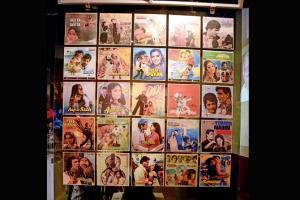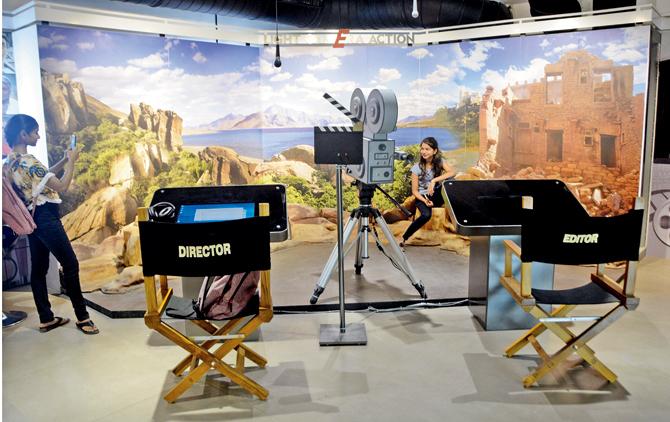The newly launched National Museum of Indian Cinema offers engaging insight into the origins of cinema and filmmaking but falls short of offering a balanced tribute to cine icons

An array of film posters. Pics/Sneha Kharabe
Tucked behind the headquarters of the Films Division at Pedder Road, the newly opened National Museum of Indian Cinema, at first glance, is a sight that every Mumbaikar will be proud of. Spread across two two- and four-storeyed buildings, the space is appealing from outside, even though some more attention could be paid to the cleanliness inside. The display of texts is accurate, and a beautiful splash of colour across all floors befits the vibrant industry being depicted.
ADVERTISEMENT
Throughout our three-hour-long-tour, we find ourselves divided about whether the museum does justice to the rich history of an industry that's inarguably among the most pertinent ones to define India, and also the most showcased aspect of the country on a global stage. To begin with, Films Division (managed by the I&B ministry) win brownie points for curating and showcasing the phases, defining moments and faces that have made the industry what it is today.
![]()
A display of matinee icons
Transporting us to a time that wasn't as technologically advanced, it manages to have us googly-eyed and grinning from ear-to-ear as we walk through eras, starting from the late 1880s, that shone amidst fractured soundtracks and pixelated scenes. Yet, there are phases and luminaries that we wish had been better explored, and this leaves us disappointed.
A lack of balance is evident when representing creators of the Indian film industry: while a few like Dadasaheb Phalke have been deeply celebrated, others like Satyajit Ray and music legends like RD Burman have been abbreviated to posters and superficially tackled.
![]()
Only days after its launch, the museum lets us down given that certain interactive platforms were rendered non-functional due to technical glitches. We would also love to revisit the souvenir shop when it's ready for customers. Nonetheless, for the city's cinephiles and the cine tourists, this addition must not be ignored. The Guide picks the Top four sections that deserve a dekko.
On Tuesday to Sunday, 11 am to 5 pm
At Gulshan Mahal, 24, Pedder Road, Cumballa Hill.
Call 23551301
Email [email protected]
Itihaas gavah hai: Origin of cinema
Where: Gulshan Mahal, ground floor

Mutoscope
Making the origin of motion pictures an interactive experience, the first room of Gulshan Mahal exposes how the persistence of vision was employed by early filmmakers like Hiralal Sen and HS Bhatavadekar to make movies using images.

Zoetrope and animal locomotion are objects of optical illusion on display
Revisiting history as it traces the work of the Lumière Brothers, it exposes the relevance of the inventions in India, and how Indian mythology was among the first aspects to be dabbled in by filmmakers, before social and political topics were explored.

Punctuating historic facts — like the first few prominent events in India that were captured on camera — the room allows one to see how motion pictures came about with the use of the obscure camera, and optical illusion toys.
Yeh bachon ka khel nahin: Filmmaking
Where: Main museum, second floor
An opportunity to expose children to a career in filmmaking, this interactive playroom of sorts tests your ability as sound recorder and visual storyteller. After showcasing a clip from a selection of six movies, it asks the participant to recreate the soundtrack using sound loops that must be positioned at crucial points in the clip.

The camera work section
Another section showcases how animation techniques are employed to transport individuals to picturesque locations, while a third gives a participant the chance to turn director and capture the work of willing actors, live.
Picture abhi baaki hai: The making of a film
Where: Main museum, fourth floor
While we had hoped this phase would be more interactive than it is, the sheer amount of work that goes behind creating a film, we realise, makes that difficult to pull off in a single room. Tracing the umpteen processes that go behind making a script into a movie, this room also highlights how technology altered the different aspects of filmmaking, over time.

The animation section has an interactive installation
An assortment of cameras employed over the years has also been appropriately placed to enhance the experience. Tired of strolling around in the museum? You can also grab a spot and watch an ongoing film playing at a screen here.
Baapu ne bola: Gandhi and cinema
Where: Main museum, third floor
For someone who had unabashedly expressed his aversion to cinema, it's ironic that Gandhi has an entire floor of the museum dedicated to him. Irrelevant though it may seem, a timeline that traces the history of cinema alongside the subsequent happenings in Gandhi's life in a particular year, makes for interesting insight.

A screening of Ram Rajya that plays on loop
And while he had watched only one film in his life — Ram Rajya — this room reveals the influence he had in cinema. The innumerable films based on Gandhi's ideologies, and him, can take even the biggest cinema buffs by surprise.

Posters of films made on Gandhi
Catch up on all the latest Mumbai news, crime news, current affairs, and also a complete guide on Mumbai from food to things to do and events across the city here. Also download the new mid-day Android and iOS apps to get latest updates
 Subscribe today by clicking the link and stay updated with the latest news!" Click here!
Subscribe today by clicking the link and stay updated with the latest news!" Click here!






